Dr. Daniel R. Swale
Associate Director
Associate Professor
Insect Neurophysiology and Toxicology
Dr. Daniel Swale received his B.S. in Biological Sciences at Christopher Newport University, a M.S. degree in Life Sciences from Virginia Tech, a Ph.D. degree in Insect Toxicology from University of Florida, and a Postdoctoral Fellowship in Neuropharmacology at Vanderbilt University Medical Center. Dr. Swale specializes in insect toxicology and physiology with a focus on physiotoxicology of ion channels and ion transporters that are underexplored to bridge the fundamental knowledge gap that limits our understanding of insect systems. In addition, the Swale Lab studies how pathogens alter physiological pathways in the arthropod vector to enhance virulency, pathogenesis, alter arthropod behavior, or alter vector competency. Knowledge gained by our various projects will aid in exploiting the plasticity of insect systems to facilitate the development of novel therapeutics for arthropod control (e.g. vectors of human pathogens) or for enhancement of arthropod systems (e.g. honey bee health).
Outside of work, Daniel spends his free time fishing (fresh and salt water), hunting (feathers or fur), and running.
-
Research
Research specialization
- Mode of action and neurotoxicology of insecticides and drugs
- Mechanisms of drug resistance
- Physiology of ion channels and ion transporters
- Development of novel insecticides
Research Overview
Research in the Swale Lab focuses on the neurophysiology, molecular physiology, and neurotoxicology of ion channels and ion transporters in insects and arachnids. Many species of arthropods have significant impacts on human health, animal health, and the economy and therefore, my research program aims to gain fundamental knowledge that we can apply to reduce the burden of arthropod pests and increase the health of beneficial insects through the ultimate development of novel mechanism insecticides, vaccines, or genetic technologies. Our research, which is of interest to insect and mammalian physiologists, vector biologists, and toxicologists, can be divided into three independent but complementary topics described below:
- Physiological characterization of potassium ion channels and transporters in the arthropod nervous system
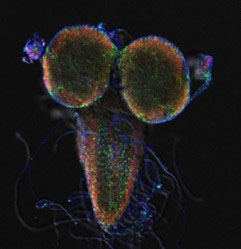
Immunostaining for Kir channel expression (blue) in the central nervous system of Drosophila melanogaster
This research aims to characterize the fundamental physiology and toxicological potential of under explored ion channels and transporters in the insect nervous system. We specifically focus on unexplored potassium conductance and transport pathways in the neuron and glial cells of Drosophila and mosquito nervous systems. These studies provide fundamental insights into the neural networks used by arthropods to guide insecticide development or provide a holistic understanding of model organisms for mammalian disease research. These studies employ state-of-the art methods that include patch clamp electrophysiology, extracellular recordings, calcium imaging, genetic manipulations, and immunocytochemistry. - Physiological characterization of ion channels for arthropod salivary gland function and feeding
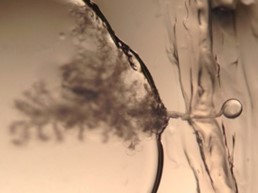
Isolated tick salivary gland secreting a droplet of saliva
Blood or sap feeding is the root cause for most damage inflicted by arthropods and thus, the development of products aimed at interrupting the feeding process would be a novel and timely invention for controlling arthropods. The salivary gland of arthropods is essential to successful feeding events whether it be for blood feeding or sap sucking insects. Despite the significant role the salivary gland plays in feeding and pathogen transmission, there is an underwhelming amount of knowledge pertaining to the neurobiology, membrane physiology, and organization of the feeding systems for the majority of arthropods. This lack of knowledge limits the ability to develop novel control agents, such as vaccines and synthetic chemistry. Considering this, my laboratory aims to characterize the physiological role and toxicological potential of ion channels and ion transporters that maintain the cellular milieu of the gland to ultimately enable salivation and feeding. These studies employ state of the art methods that include calcium imaging, voltage clamp electrophysiology, immunocytochemistry, electron dispersal microscopy, and biological assays. - Pollinator Health and Protection
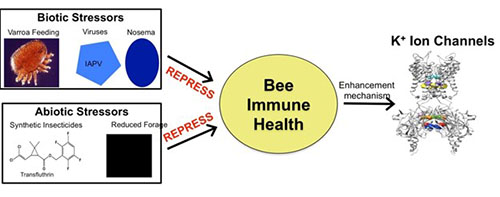
Schematic overview of the project
Pollinator health is of current interest to the agricultural and scientific community due to the extreme economic benefit these insects provide combined with the unexplained losses that have been observed over the past decade. The Swale Lab, in collaboration with Dr. Troy Anderson (U. of Nebraska-Lincoln), is integrating a general understanding of bee biology with advanced physiological techniques to understand the interplay between potassium ion homeostasis, innate antiviral immunity, and overall health of the honey bee, Apis mellifera. These studies integrate a combination of molecular biology, biochemical assays, biological assays, and field studies. - Development of novel chemistry for arthropod vector control
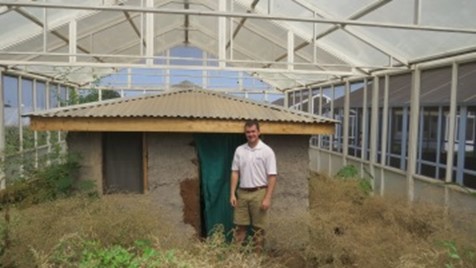
Dr. Swale in front of a semi-field habitat used for studying the horizontal transfer of novel K+ channel insecticides. Photo taken at ICIPE – Mbita Point, Kenya.
The mosquito, Anopheles gambiae, is the vector of the malaria parasite and is considered to be the deadliest animal in the world. We are currently developing novel chemical scaffolds to control arthropod vectors of medical and agricultural relevance, which include mosquitoes, ticks, aphids, and stink bugs.
-
Teaching
Dr. Swale is responsible for teaching graduate level Insect Toxicology.
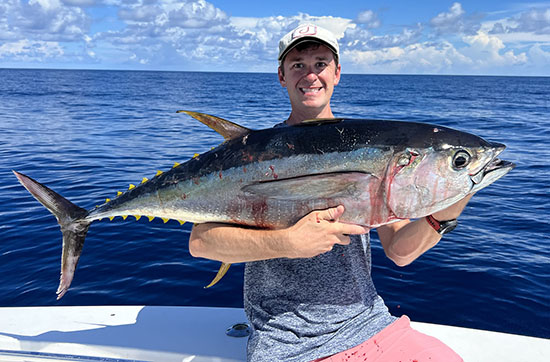
Contact
(352) 273-9149
dswale@epi.ufl.edu
-
Education
- Postdoctoral Fellow, Neuropharmacology, Vanderbilt University Medical Center, 2015
- Ph.D., Insect Neurotoxicology, University of Florida, 2012
- M.S., Entomology, Virginia Tech, 2009
- B.S., Christopher Newport University, 2008
- Publications
-
Active Awards
- Center for Arthropod Management Technologies (CAMTech). Defining the cellular expression profile of aphid salivary glands for development of “bee-friendly” aphicides. Daniel R Swale, Bryony Bonning, and Werner Geldenhuys.
- National Institute of Health, NIAID, R01-supplement. Ion channel- and pathogen- regulation of salivary proteome for horizontal transmission of tick-borne pathogens. Supplement to R01 AI168089-01. Daniel R Swale (PI), Albert Mulenga (co-PI).
- Calibr the Scripps Research Institute. Development of novel isoxazoline insecticides for control of tick populations. Daniel R. Swale (PI).
- USDA-NIFA, Agriculture and Food Research Initiative. 2021. Investigating the impacts of covert virus infection to visual pathways and responses in the honey bee. Daniel R. Swale (PI), Nathan Lord (co-I), Troy D. Anderson (co-I), Michael Simone Finstrom (co-I).
- National Institute of Health, NIAID, R01. Rickettsial influence on host membrane physiology in arthropod vectors. Daniel R Swale (PI), Kevin Macaluso (coPI), Albert Mulenga (co-PI).
- USDA-NIFA, Agriculture and Food Research Initiative. 2019. Physiological and toxicological relevance of K+ ion channels and reactive oxygen species to honey bee health. Daniel R. Swale (PI), Troy D. Anderson, Michael Simone Finstrom.
- USDA-NIFA, Agriculture and Food Research Initiative. 2019. Novel ways to plug the bug: Unraveling the role of hemipteran Kir channels in feeding and plant pathogen transmission. Daniel R. Swale (PI), Jeffrey A. Davis, Zhijun Liu.

